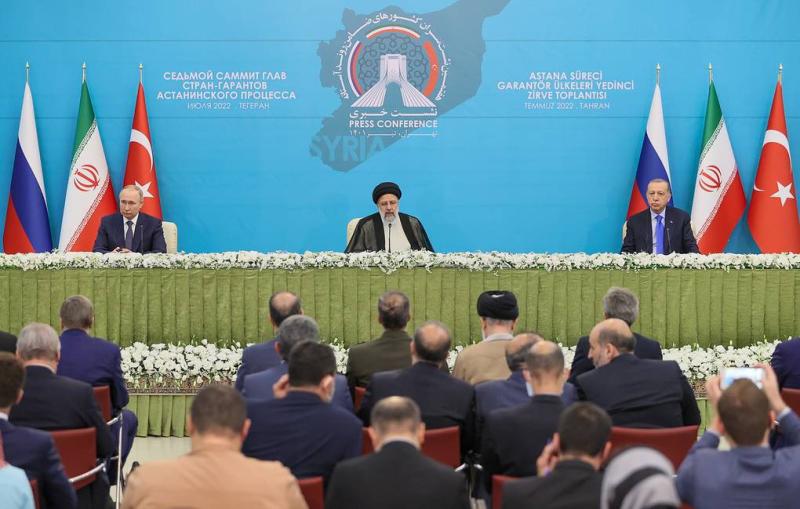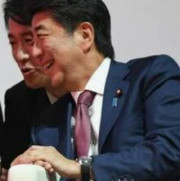
© Sergei Savostyanov/TASS
Top stories from the Russian press on Wednesday, July 19th, prepared by TASS
Izvestia: What Russia, Iran and Turkey agreed on at Tehran summit
Russia, Iran and Turkey released a joint statement following the July 19 trilateral summit in Tehran, reaffirming their commitment to Syria’s sovereignty and territorial integrity, while expressing their determination to continue cooperating to resolve the Syria issue. Russian President Vladimir Putin also held several bilateral meetings on the sidelines of the summit, Izvestia writes.
Bilateral conversations, including Putin’s meetings with Iran’s President Ebrahim Raisi and Supreme Leader Ayatollah Ali Khamenei, took center stage. Russia and Iran can reduce the impact of sanctions they both are facing by working together, Professor of the Department of World Economy and International Economic Relations at the State University of Management Galina Sorokina pointed out. "Besides, significant oil and gas reserves make it possible for Russia and Iran to play an important role on the energy market based on certain agreements," the expert added. The Russia-Iran talks are also important in terms of the nuclear deal’s future.
As for Putin’s meeting with Turkish leader Recep Tayyip Erdogan, the emphasis was on Ukrainian grain exports. Turkey can act as a guarantor of safe transportation of energy resources and grain, Sorokina noted. Besides, Moscow is interested in expanding trade with Ankara in the field of high-tech and pharmaceutical products, light and food industries, the expert added.
After bilateral talks, the three countries’ leaders focused on the Syria issue. All the parties were interested in the Tehran summit as the leaders need to keep comparing their positions on the situation in Syria, Turkish political analyst Kerim Has told Izvestia.
The Moscow-Tehran-Ankara trilateral platform has been active for five years, producing certain results, Russtrat Institute Director Yelena Panina emphasized. There still are disagreements between the countries on the Syria issue and the situation in Nagorno-Karabakh but the parties are set to maintain dialogue rather than lecture each other and exchange ultimatums, the expert concluded.
Vedomosti: EU plans to impose new sanctions on Russia while easing previous ones
The EUobserver news outlet has reported, citing a draft document, that the European Union’s seventh package of sanctions against Russia was agreed upon at the ministerial level and is waiting to be approved by the EU’s government bodies. The restrictions will target Russian military commanders and politicians, as well as pro-Russian officials in the liberated areas of Ukraine. Russian gold imports will also be banned, with the exception of jewelry, Vedomosti writes.
The seventh package of sanctions previewed by the media is in fact aimed at implementing earlier political statements, whereas plans to ban Russian gold were announced at a G7 meeting in Germany in late June and the United States has already imposed such restrictions, Russian International Affairs Council expert Ivan Timofeev noted.
As for statements about strict control in the field of dual-use technologies and sanctions against defense companies, there is nothing new, the expert said. In theory, the list of companies directly and indirectly involved in the related production work, as well as the blacklists of individuals, can be expanded further but no major breakthroughs should be expected, Timofeev added.
Meanwhile, EUobserver also announced an easing of sanctions on a number of banks with regard to food-related transactions. This will be the first precedent when the restrictions are eased, sanctions law expert Sergey Glandin pointed out. "Indeed, the West has gone slightly overboard with its sanctions crusade against Russia. Last week, as we all remember, the US lifted all sanctions on food and fertilizers, issuing several general licenses and providing related clarifications. Now, it’s the EU’s turn," the expert noted. "It’s easy to introduce sanctions. However, even Brussels can’t figure out how it will work the other way around. This is why we will certainly see further easing in Europe’s policy, at least in terms of food products," Glandin emphasized.
Vedomosti: EU-China ties on the decline
The South China Morning Post newspaper has reported, citing high-ranking sources in Beijing, that German Chancellor Olaf Scholz, French President Emmanuel Macron and the prime ministers of Italy and Spain, Mario Draghi and Pedro Sanchez, had been invited to Beijing for talks but ignored the invitation. Beijing did not officially confirm these reports, while European capitals declined to comment, Vedomosti notes.
Relations between China and the European Union have been steadily declining for several years, despite China’s growing role in European trade, Director of the Center for Comprehensive European and International Studies at the Higher School of Economics Vasily Kashin pointed out. According to the expert, deterrents include the EU’s discontent with China’s industrial and trade policy based on protectionism, as well as a convergence of European and US policies in Asia, triggered by pressure from Washington. In recent years, the EU stepped up its criticism of China over human rights, the situation in the South China Sea and around Taiwan, as well as on other issues, while China’s response has always been as hard-hitting as possible.
As a result, relations started to deteriorate, Kashin stressed. The outcome of the recent NATO summit, where China was named as a challenge to the alliance, further worsened relations. However, in the expert’s words, an extremely high level of economic interdependence is so far preventing a collapse in ties, holding back the parties from using any tools of economic war.
Europe is following in the footsteps of the US for whom a standoff with China is crucial, Editor-in-Chief of the "Russia in Global Affairs" magazine Fyodor Lukyanov emphasized. After uniting allies against Russia, Washington now seeks solidarity among European countries against China. Relations between Europe and China will continue to deteriorate in the future but trade ties won’t collapse because it’s important for China to maintain economic and social stability and it will try to avoid an intense confrontation.
Izvestia: Russia, Norway manage to resolve Spitsbergen transit issue
Russia and Norway have come up with a mechanism for the transit of goods to the island of Spitsbergen, agreeing that Oslo will inspect all goods from Russia for compliance with sanctions, Russian Consul General on Spitsbergen Sergey Gushchin told Izvestia.
Federation Council Deputy Speaker Konstantin Kosachev, in turn, told the paper that Russia and Norway had managed to resolve the most pressing issue, "ensuring an uninterrupted delivery of goods and providing for the everyday needs of Russian nationals who work on Spitsbergen." He added, however, that the new transportation arrangement "will raise logistics costs to a certain extent."
Chairman of the Federation Council’s Foreign Affairs Committee Grigory Karasin told Izvestia that if Norway’s sanctions-related inspections delayed deliveries, Russia would embark on an international lawsuit, particularly appealing to the World Trade Organization.
Program Director at the Valdai Discussion Club Oleg Barabanov points out that Norway’s sanctions don’t apply to direct deliveries to Spitsbergen and if Russia moves to deliver goods to the archipelago by sea or by air, Norway will have no right to prevent it. However, sanctions remain in effect in terms of the country’s land border and maritime ports.
Australian expert on Arctic security Elizabeth Buchanan, a fellow with West Point Military Academy’s Modern War Institute, believes that Norway did violate an agreement on Spitsbergen when it blocked the replenishment route. According to her, Russia could have used other methods to ensure goods deliveries to its community on the archipelago, without using Norwegian ports. But the matter is that Moscow sought to highlight its rights to Spitsbergen, the analyst explained.
Kommersant: Russian ruble keeps growing stronger
Russia’s national currency continues to strengthen. On July 19, the dollar exchange rate dropped to the lowest level since the beginning of the month. The ongoing sale of foreign exchange earnings, particularly ahead of tax payments to the budget, is the main thing that is determining market movements, Kommersant writes.
Market participants point out that factors facilitating the strengthening of the ruble remain the same. In particular, they include the forthcoming tax and dividend payments, efforts to get rid of excessive foreign currency reserves and the risk of sanctions. Investment Director at Loco-Invest Asset Management Dmitry Polevoy mentioned a slight rise in oil prices as another factor.
According to Oleg Syrovatkin, a leading analyst at the Otkritie Investments Global Research Department, the ruble’s weakening in late May and early July was mostly caused by verbal interventions. In the first case, the reasons also included a move to reduce the level of mandatory sale of foreign exchange earnings for exporters and the Central Bank’s decision to lower the key rate. However, both times, the weakening trend did not persist. Syrovatkin explains that in the first case, the measures taken weren’t enough to change the imbalance between a large inflow of foreign currency and insufficient demand for it. In the second case, no specific steps followed.
Syrovatkin expects that the dollar may fall to the 50-55 ruble mark during the July fiscal period that will peak next week. Once tax payments are over, the dollar’s exchange rate may rise to 57-59 rubles, Head of Department of Structured Products at Zenit Bank Geldy Soyunov noted.









